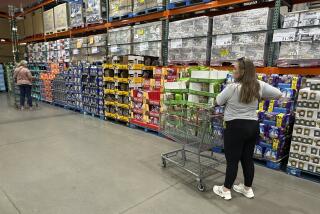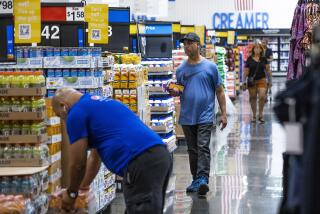Confidence Index Exceeds Forecast
- Share via
Consumer confidence jumped to a two-year high in June, buoyed by an improved job market and softening gasoline prices, the Conference Board reported Tuesday.
The upbeat news contrasted with early reports this week of a slowdown in retail sales in June. But economists shrugged off those figures, which were blamed primarily on cool weather in the South and Northeast, as a temporary setback.
The consumer confidence index, which barely budged in May, increased nearly 9 points to 101.9, up from a revised reading of 93.1 in May. The latest reading was much better than the figure of 95 that analysts had expected.
Lynn Franco, director of the New York-based Conference Board’s Consumer Research Center, said the strong improvement in current business conditions propelled consumer confidence to the highest level since June 2002, when the indicator was 106.3.
The present-situation index is now 104.8, up from 90.5 in May. The expectations index, which measures consumers’ outlook over the next six months, rose to 100 from 94.8.
“Consumers expect the economy to continue to grow at a healthy clip and to continue to generate additional jobs,” Franco said.
The survey’s cutoff for June’s preliminary results was June 22, before the transfer of power in Iraq.
Economists track consumer confidence because consumer spending accounts for two-thirds of U.S. economic activity.
Mark Vitner, an economist at Wachovia Corp., said he believed that the recent improvement in consumer confidence largely reflected improving employment conditions.
He said June’s lackluster retail sales were “only temporary,” largely attributable to the undesirable weather conditions and the lingering effects of higher gasoline prices, which have come down and are the lowest in two months.
Both Wal-Mart Stores Inc., and Target Corp. warned Monday that sales in June at stores opened at least a year would be lower than projected. The nation’s retailers are set to report their June sales figures July 8.
Vitner added, “If gasoline prices keep coming down over the summer, then the damage is limited,” he said. But if gas prices don’t continue to decrease, he said, consumer spending in 2005 will be affected.
Joel L. Naroff, president and chief economist at Naroff Economic Advisors Inc., said that though he was encouraged by the consumer confidence figures, there was still plenty of uncertainty. “We have to see wage increases start to kick in before we see consumers feel really good,” he said.
More to Read
Inside the business of entertainment
The Wide Shot brings you news, analysis and insights on everything from streaming wars to production — and what it all means for the future.
You may occasionally receive promotional content from the Los Angeles Times.










